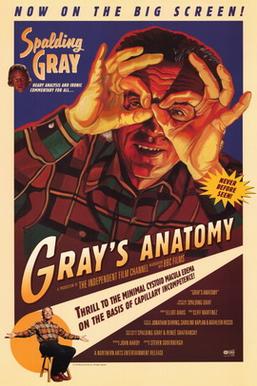Gray's Anatomy (film)
Gray's Anatomy is a 1996 American film directed by Steven Soderbergh, featuring a monologue by Spalding Gray. Based on Gray's own experiences, the film interweaves his personal tales and thoughts with a particularly idiosyncratic humor, focusing on his diagnosis with a rare ocular condition and his subsequent quest for a cure.
Plot[edit | edit source]
The narrative centers around Spalding Gray, who, after being diagnosed with a Macular pucker, embarks on a journey to seek alternative treatments. This quest takes him away from the conventional path of Western medicine, leading him to explore a variety of healing methods, including Christian Science, Native American sweat lodges, and Philippine psychic surgeons. The film is a blend of monologue, dramatization, and animation that illustrates Gray's anxieties, beliefs, and his relentless quest for healing.
Production[edit | edit source]
Directed by Steven Soderbergh, Gray's Anatomy marks one of the unique collaborations between the filmmaker and Spalding Gray. The film's distinctive style is achieved through a mix of direct-to-camera monologue delivery and visual sequences that aim to visualize Gray's internal experiences and the eccentric characters he encounters on his journey. The production design and cinematography are tailored to complement Gray's storytelling, using minimalistic sets and innovative lighting to focus on the narrative's emotional depth.
Reception[edit | edit source]
Upon its release, Gray's Anatomy received mixed to positive reviews from critics. The film is praised for its unique narrative structure, Soderbergh's direction, and Gray's performance. It is noted for its exploration of themes such as health anxiety, the search for meaning in illness, and the critique of the medical establishment. However, some critics found the film's format to be less engaging than Gray's earlier monologue-based works.
Legacy[edit | edit source]
Gray's Anatomy has since been recognized as a significant work in the genre of monologue films and is celebrated for its innovative approach to storytelling. The film contributed to the legacy of Spalding Gray as a master monologist and has been studied for its unique blend of humor, personal narrative, and critique of the medical industry. Following Gray's tragic death in 2004, the film has also been viewed through the lens of his struggles with mental health, adding a layer of poignancy to its reception.
Search WikiMD
Ad.Tired of being Overweight? Try W8MD's physician weight loss program.
Semaglutide (Ozempic / Wegovy and Tirzepatide (Mounjaro / Zepbound) available.
Advertise on WikiMD
|
WikiMD's Wellness Encyclopedia |
| Let Food Be Thy Medicine Medicine Thy Food - Hippocrates |
Translate this page: - East Asian
中文,
日本,
한국어,
South Asian
हिन्दी,
தமிழ்,
తెలుగు,
Urdu,
ಕನ್ನಡ,
Southeast Asian
Indonesian,
Vietnamese,
Thai,
မြန်မာဘာသာ,
বাংলা
European
español,
Deutsch,
français,
Greek,
português do Brasil,
polski,
română,
русский,
Nederlands,
norsk,
svenska,
suomi,
Italian
Middle Eastern & African
عربى,
Turkish,
Persian,
Hebrew,
Afrikaans,
isiZulu,
Kiswahili,
Other
Bulgarian,
Hungarian,
Czech,
Swedish,
മലയാളം,
मराठी,
ਪੰਜਾਬੀ,
ગુજરાતી,
Portuguese,
Ukrainian
Medical Disclaimer: WikiMD is not a substitute for professional medical advice. The information on WikiMD is provided as an information resource only, may be incorrect, outdated or misleading, and is not to be used or relied on for any diagnostic or treatment purposes. Please consult your health care provider before making any healthcare decisions or for guidance about a specific medical condition. WikiMD expressly disclaims responsibility, and shall have no liability, for any damages, loss, injury, or liability whatsoever suffered as a result of your reliance on the information contained in this site. By visiting this site you agree to the foregoing terms and conditions, which may from time to time be changed or supplemented by WikiMD. If you do not agree to the foregoing terms and conditions, you should not enter or use this site. See full disclaimer.
Credits:Most images are courtesy of Wikimedia commons, and templates Wikipedia, licensed under CC BY SA or similar.
Contributors: Prab R. Tumpati, MD

